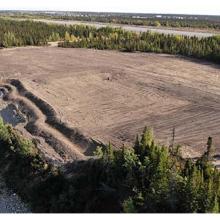Image set

Related services
Opening article section
Article section
Lead
Rich text
At the Canadian Association of Consulting Engineering Companies virtual gala held last night, Englobe won an Award of Excellence for its major project to rehabilitate and treat contaminated soils in Block D, a parcel of land located on the territory of the Cree Nation of Chisasibi, Quebec.
“Congratulations to everyone involved in this project, the members of the Englobe team, our client’s representatives, and the local partners of the Chisasibi community. We couldn’t have done it without you! Receiving this prestigious recognition from the Association is a true honor and a testament to the success of this collaboration.” said Mike Cormier, Copresident, as he accepted the award on Englobe’s behalf.
In 2015, Hydro-Québec retained Englobe to manage this large-scale environmental remediation project. The former oil depot was active during the construction of Phase 1 of the La Grande River hydroelectric complex from 1973 to 1984. The site was dismantled in 1996, but the historical activities that took place had left the site contaminated with petroleum hydrocarbons, with over a thousand barrels buried on site.
Englobe’s team worked closely to build relationships with stakeholders, assist in the training of the contractor’s Cree staff, and implement work practices that reinforced a health and safety culture. All of these efforts have resulted in the achievement of the rehabilitation objective.
Meeting the challenges
Chisasibi is located on the eastern shore of James Bay and the southern shore of the La Grande River. Projects in this region face challenges related to cold weather, remoteness, lack of infrastructure and resources, short summer soil treatment seasons, difficult and variable terrain conditions, and limited access to skilled labour. These factors can lead to problems with transportation, material handling, coordination, equipment design and maintenance.
In terms of stakeholder relations, this was a very sensitive project involving the Cree Nation of Chisasibi (CNC), the Government of Quebec and Hydro-Quebec. From the beginning of the project, building trust between the groups was a priority.
In order to ensure regular liaison with the stakeholders and to respect the project schedule, a non-traditional project management and monitoring committee (PROM) was set up. It was composed of representatives from all groups. The PROM maintained open lines of communication, ensuring that everyone understood the priorities, goals, and desired outcomes. This team approach ensured that the work was done in accordance with the expectations of all parties.
Englobe participated as an active member of PROM, helping to facilitate discussions and share an understanding of the work to be done based on a scientific approach. Over the five years of the project, the team regularly coordinated additional opportunities to solicit stakeholder input. Their responsiveness and deep understanding of all aspects of the project contributed to its success.
Englobe’s team also contributed to the establishment of a strong occupational health and safety (OHS) culture by assisting the contractor in enhancing its program. Englobe also promoted training for all of the contractor’s employees and assisted in the development of job safety analyses and daily safety meetings.
Englobe’s team proactively managed community concerns regarding potential residual odours from treated soils. A dedicated subcommittee was formed to investigate methods of mitigating these odours, investigate methods of qualitative and quantitative characterization of these odors, investigate methods of ambient air sampling, and develop an odour lighting protocol to compare different mitigation methods.
Mentoring
The Englobe team took the initiative to organize in-person training workshops for local workers involved in the project. These workshops helped to build trust by allowing workers to learn more about the steps of the project, what was being done with the samples collected, and how to use the data obtained.
The skills acquired in this project are transferable to various industries, thus contributing to the development of the personnel involved.
Environmental remediation of the site
The handling of fuel associated with accidental spills during the operations of the D Block repository had a significant environmental impact on the site, leaving it contaminated. The site, under provincial jurisdiction, was an enclave within the CNC’s reserved lands, but due to the contamination of the site, the handover of the land to the community could not be initiated.
Between 2015 and 2020, the project team oversaw the complete rehabilitation of the site, leaving the soil and groundwater restored and meeting applicable criteria.
During the remediation work, all measures were taken to reduce environmental impacts. This included dismantling the remaining structures of a dock used during the operation of the repository along the sensitive riparian zone of the La Grande River. All dock removal work had to be completed during a specific time period to reduce impacts on aquatic habitat and fish reproduction. Once carefully removed from the shoreline, the scrap metal from the dock was transported off-site for complete recycling. Finally, the area was redesigned to blend in with the surrounding landscape.
Other environmental measures included the application of a renewable energy-only soil treatment technology, the transportation and disposal of all project waste offsite to licensed facilities, the recycling of all other metals found on site, the reuse of project materials (turbine, chimney, tarps, etc.), and the management of revegetation of the entire site.
The final stages of the project were impacted by the COVID-19 pandemic, which forced the team to postpone the completion of work on the site from 2020 to 2021. Following the complete rehabilitation of the site, the process of retrocession of this parcel was able to be initiated by those concerned. With the site fully restored, the Chisasibi Cree Nation will be able to enjoy this beautiful space.
ACEC: Major Environmental Remediation project in Chisasibi, Québec
Congratulations to the whole project team!